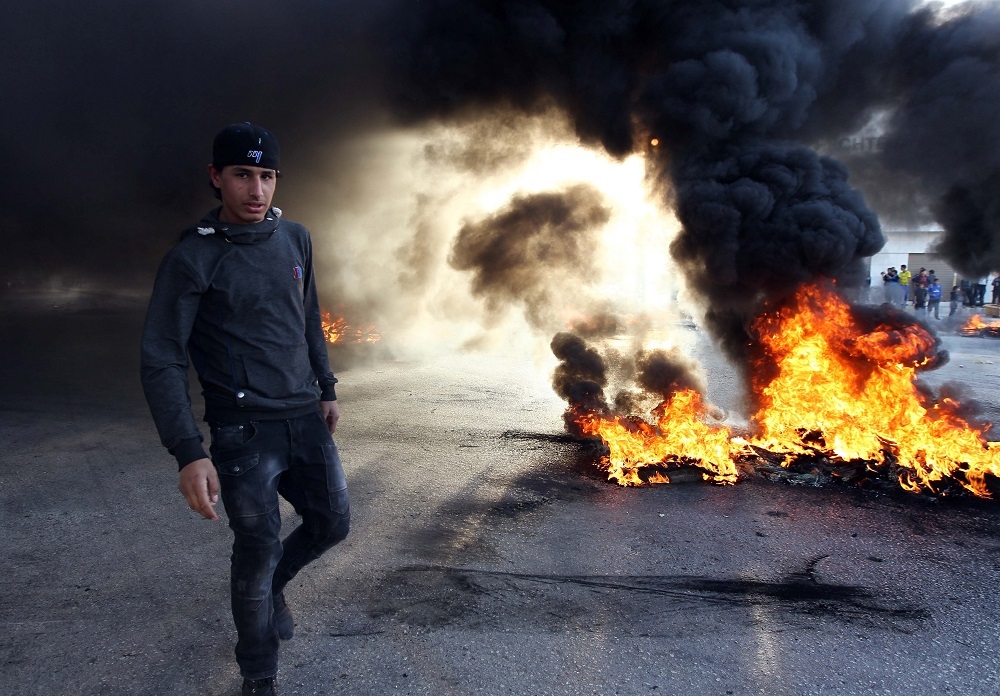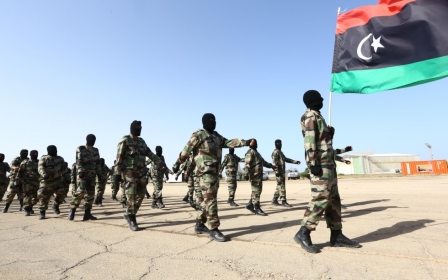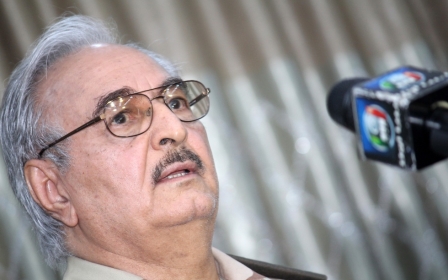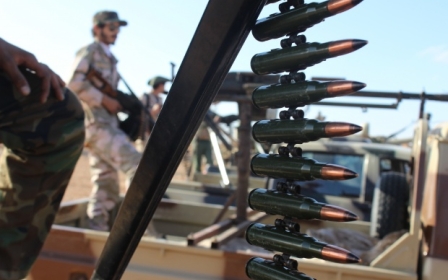The attempt to silence Libya’s activist generation

TRIPOLI, Libya – Adam, a young Libyan activist, was walking back from a late-night protest when he noticed in the darkness the outline of a four-wheel drive tailing him. It was July and he had been at a peaceful rally in one of Tripoli’s main squares against the violence that was rocking the capital, as heavily armed militias battled for control of territory.
According to Adam, before he had a chance to turn and run, two men brandishing Kalashnikovs hit him in the face with the butt of their guns and bundled him into the car.
“They forced my head between my knees then covered my face with a black plastic bag, so I couldn’t see anything,” he told Middle East Eye.
Adam says he was then driven for hours off-road to a “secret location” in the surrounding countryside. Blindfolded and handcuffed, he claims to have been interrogated about his protesting and to have been lashed with a rope.
After a few days he was released, bruised and bleeding, into a part of the desert that he said is “known for dumping dead bodies".
“They said this was a warning and next time would be my last,” he said.
Adam counts himself lucky. Dozens of activists who have spoken out against the militias have disappeared amid a spate of kidnappings and killings since June, driving the comparatively new but lively movement into exile or underground.
From the capital alone, 25 people have reportedly been abducted since summer, activists said. Some of them, like prominent protester Abdel-Moaz Banoun, who was taken in mid-July, are still missing and presumed dead.
In Libya’s second city of Benghazi, the number of abductions is higher and members of the activist community also are facing the threat of assassination.
The latest was in September when two teenage activists, Tawfik Ben Saud, 18, and Sami Elkawafi, 17 – known for their creative peace rallies – were shot dead during a 24-hour killing spree dubbed "Black Friday" that saw 10 people gunned down by extremists.
In fact, Libya is witnessing an unprecedented wave of violence as it once again plunges into civil war, just three years on from the 2011 NATO-backed revolt that ousted dictator Muammar Gaddafi.
According to a recent study by Danish anti-torture group Dignity, a fifth of the country’s households have a family member who has disappeared since the uprising, while five per cent reported at least one relative had been killed.
Among those taken, beatings, suffocation and sexual, thermal and electric torture were reported.
The “widespread and gross human rights violations” in Libya have left nearly a third of the country with anxiety and depression, according to Dignity.
A new civil war
The state that rose from the ashes of 40 years of chaotic Gaddafi rule is fighting to control the very rebel militias that supposedly liberated it.
This summer it reached a boiling point as Libya Dawn, a coalition of militias and Islamist-leaning politicians, took control of Tripoli, which resulted in the elected parliament and its government moving over 1000km east into exile in Tobruk.
Libya Dawn set up its own administration to rival the internationally-recognised authorities, which Libya Dawn claims have no legitimacy after a recent court order declared the parliament to be unconstitutional.
The Tobruk authorities hit back with force, launching ongoing airstrikes on Libya Dawn positions in the west, a move which the United Nations – attempting to broker a peace deal – has condemned.
The activists, who are calling for the disarmament of militias and the building of a proper army and police force, are now caught in the crossfire.
“I’m against all the militias and the attitudes from both sides. But without a functioning police force, army or state there is no one left to defend us,” said Sara, a 35-year-old rights activist still hiding in the capital. She started receiving anonymous threats as early as 2012 when she criticised the decision to absorb the brigades of ex-rebels into the security apparatus and to pay them salaries, which the state is still doing.
But she said it got worse after she joined protests against Libya Dawn’s takeover of the capital and publicly expressed support for the country’s fledging “national army" – the shattered remains of the Gaddafi-era armed forces that defected in the revolution and now answer to General Khalifa Haftar and the Tobruk authorities.
Sara started receiving texts and phone calls threatening to kill her at her home. As has happened to many others, Facebook pages appeared - calling for her kidnapping and assassination - that included personal details like photos of family members and addresses.
Fellow Tripoli activist and journalist Ahmed, 38, told the same story. “I was submitting 12 Facebook reports a day against pages calling for my execution. Every time we got one taken down another would pop up in its place with all the info about me,” he said.
Activist exodus
When prominent anti-militia activist Abdel-Moaz Bannoun was taken in mid-July and the fighting intensified, there was a mass exodus of the capital’s activists.
Shortly after Bannoun was abducted, an Islamist militia coalition called the Operation Room of Libya’s Revolutionaries, which is now part of Libya Dawn, said on its Facebook page that its troops had “arrested” him over allegations he had served under Gaddafi and had “instigated rallies” against the militias.
But the post was swiftly taken down and there has been no mention of his whereabouts since. Libya Dawn officials deny he is in their custody.
The abduction of Banoun rattled the activist community.
“Directly before Banoun was taken there were posts about him on social media pages… So when you find your name on a similar Facebook page with thousands of likes and comments, you feel pretty threatened,” said Samir, one of Banoun’s friends, who has since moved his family to Europe.
For some like Sara, who had been vocal in her support for the operations of General Haftar, leaving is not an option. She claims her name is on militia hit lists at the land border with Tunisia and airports they control, so she risks being taken as she leaves.
Instead, she hid at a friend’s house and faked a trip to Europe on social media by posting old holiday photos every day to make it look like she had escaped.
"There is no way I can show up in public or attend any of the demos,” she said, adding that even driving to the supermarket was a risk. "We’ve reached the point where we cannot express our opinions or feelings – even on my personal and private Facebook page,” she added. Phones are reportedly tapped; emails and social media accounts are carefully watched.
Women targeted
Women are particularly at risk in conservative Libya because of a cultural backlash against them for being present and active in the streets, said women’s rights activist Maya, who is planning to leave Libya in the next few months.
They face the additional threat of rape, said Maya, “because if we’re on the streets we’re fair game".
“They also attack our families – sometimes they call the father or husband and say you better silence your daughter or wife or else. I'm ready to risk my life, but not that of my father’s,” she told MEE.
Maya said the watershed moment for her was the June assassination in Benghazi of Salwa Bughaighis, a 50-year-old human rights champion, women’s rights activist and mentor for revolutionary youth.
Militants in heavily-armed pick-up trucks arrived at Salwa’s villa, wounded the security guard, stormed into her living room and shot and stabbed her, before abducting her husband Essam, who is still missing. It was the first time an assassination had taken place inside someone’s home.
“Salwa was an educated, strong female, who had been working on these issues for a long time and was well respected across the board. For it to get to the point where the attackers could walk into the house of someone so high profile – who was working on apolitical issues like peace-building and dialogue – was ridiculous,” Maya said.
“Women across the country just stopped what they were doing and left,” she added.
One of the few witnesses and the investigating officer were later killed under mysterious circumstances and the case was hastily dropped. In the grip of civil war, and with no functioning legal system, the assailants are able to continue their attacks with impunity.
So it is left to the families to find their missing relatives or to piece together who was responsible for the deaths of their loved-ones.
In the case of the kidnapped, families make phone calls to contacts close to the militias, tribes or political figures to figure out what happened, or if a ransom is needed. But other than prayer, that is pretty much all they can do, Maya said.
It is too dangerous now to campaign or talk to the media. “I know people working on cases of kidnapping. They themselves are threatened; they cannot stay at their homes. The families too are in danger,” Maya said.
Propaganda battle
Adding to the problem is propaganda from all sides of the conflict due to the acute polarisation of local news outlets. Numbers of cases and details are hyped up and distorted on TV.
“The media is bi-polar – it’s either biased towards the Islamists and militias or with the [liberals] – which is a problem, there is no media that anyone can trust,” said Samir.
With foreigners being targeted by kidnappings, assassinations and threats as well, it is becoming increasingly hard for international media to report from the country. Most of the international rights groups operating in Libya have evacuated their staff.
The activists said that no one knows for certain who is behind the spike in abductions and assassinations – although, they said, evidence points to the Islamists and militias who also stand to gain the most from the disappearance of the noisy activist community.
A rising insurgency centred in the east is also a growing threat. Last month, three young social media activists in their twenties, who secretly released information online about the extremists, were beheaded in Derna, a town just east of Benghazi that is overrun by militant fighters who pledged allegiance to the Islamic State (IS) at the end of October.
A friend of the trio, still based in Derna, said the insignia of the Islamic Youth Shura Council was emblazoned on the car that took them. The group, which spearheaded the move to support IS, is an offshoot of Ansar al-Sharia, a UN-designated terror group fighting alongside Libya Dawn.
But Libya Dawn officials vehemently deny the accusations against them and the reports of activist kidnapping. They say their membership have been targeted by armed groups who support the government.
On 29 July Mustafa Abushagur, former interim prime minister and supporter of Libya Dawn, was abducted at gunpoint from Tripoli and held for 24 hours. He said he was taken by militiamen from the western city of Zintan, who have been absorbed into Haftar’s forces.
Suleiman Zoobi, a former parliamentarian also affiliated with Libya Dawn, had been taken by the same group 10 days before and is still missing.
Meanwhile, in Benghazi, Islamist militiamen claim some of the fighters have been abducted during the course of the fighting and tortured to death by Haftar’s men, their bodies dumped on the side of the road.
But Haftar’s forces are also being targeted outside of the battlefield. Dozens of his soldiers have been gunned down in executions in Benghazi. Last month the jihadi group Fathers of Injustice Brigade decapitated one of his volunteer soldiers and posted the graphic video online.
For activists who belong to neither of the warring factions and are now terrorised into abandoning their fight for a better Libya, the descent into chaos is heartbreaking.
“The feeling is unimaginably painful. I never imagined the situation would be this bad,” said Maya, her voice cracking. “We were happy, there was a hope but now even that hope has started to fade.”
Middle East Eye propose une couverture et une analyse indépendantes et incomparables du Moyen-Orient, de l’Afrique du Nord et d’autres régions du monde. Pour en savoir plus sur la reprise de ce contenu et les frais qui s’appliquent, veuillez remplir ce formulaire [en anglais]. Pour en savoir plus sur MEE, cliquez ici [en anglais].




